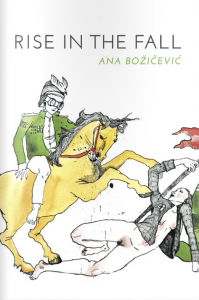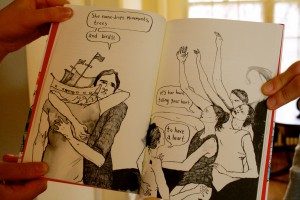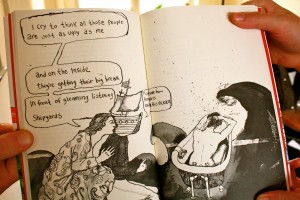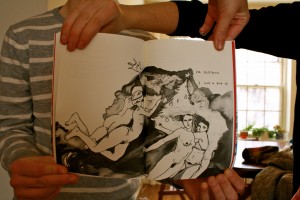 Rise in the Fall
Rise in the Fall
by Ana Božičević
Images by Bianca Stone
Birds, LLC, March 2013
80 pages / $18 Buy from Birds, LLC
Mary (Feng Sun Chen) and I are sitting in a bar on Friday afternoon. We are simple about asking. We are asking: What the fuck is a sad poem? What the fuck is a joyful poem? Bettye LaVette is pushing into the air a version of “I’m Not the One” that I like better than the original by The Black Keys. Soot everywhere. “You think that I’m normal. / All these years / I’m just trying to warn you.”
I go home and look the song up and find out Lavette is quoted. “I don’t know what’s he’s [Dan Auerbach’s] saying, but I’m saying don’t fuck with me.”
Sometimes a book of poems finds you, and you type out an email to your friend describing it as, “Now I have found the Winter of my Disco Tent.” Ana Bozicevic’s book, RISE IN THE FALL, pulls at how a woman might be when she has difficult and exhausting and hard things to write about. It pulls out at how she is a speaking, loving thing who must demand from us and and rub against us, despite the fact that she knows we still might miss it, that we might not hear her. (We’re not great listeners.) Also, the book knows that can still be fun. Also, the book knows that she can die and come back and die and come back shooting out breath she made powerful herself.
death. Even in that silence
there’s bird calls or meteors or something hurtling
through space: there’s matter and light. I’ve seen it
through the theater of the trees and it was beautiful
It cut my eyes and I didn’t even care.
-Death, Is All
The speaker of the book, the I, the queer she, is full of energy and sex and wit. She says alongside LaVette, “Don’t fuck with me.” She knows that never ending longing is never beginning to give in to what tells you to contain yourself, to get a hold of yourself, to get a masters on your complicated feelings.
Let’s drag our robes back to one of the questions: What is a joyful poem? What if your body is not a body that can experience joy unadulterated by politics, by war, by racism, by misogyny. What if you don’t have a choice, the luxury?
is brittle. A kind of waiting room made
out of marzipan
& an air of exclusivity.”
-Paris Pride Parade
RISE IN THE FALL reminds us that happiness is not always a decision. The title of the book itself comes from a sentence that casually heaves in the experience of powerlessness right at its tail, unsettling the eager readiness of its initial impulses. “We’ll rise up/ next fall, when they can no longer deport me” (Rise in the Fall). Happiness can depend heavily on what access codes you have. Or rather, why is the best joy joy is capable of often described as pure? Why can’t there be some kill in our joy? Some complexity in place of purity? In a poem that parodies/odes to (This is possible. This can be both at once.) both the New York School and Frank O’Hara’s poem, “The Day Lady Died”, Bozicevic’s I unleashes in a fury and in a frenzy,
you don’t want to hear that part, you just want me to keep having sex
among the politics.Fuck you: all I want to write about is
bumblebees, bumblebees.New York School is because
you have to name things in New York.
Otherwise, too much exists.”
-The Day Lady Gaga Died
When my students read Juliana Spahr’s Well Then There Now, a book dedicated to digging into the decidedly fucked up power of being able to name things like University buildings and streets in Hawaii (and uh, everywhere else.) after dead, upper class white men over and over and over until no one can never ever forget them or their important conquering of lawns, they were mad some of the poems in the book got poisoned by a computer translator machine. (The poems are translated back and forth between French and English several times.) “THESE ARE NOT HERS,” they cried.
“What if she was actively trying to not own the poems?” I asked them. “If she owns 51% of the poem, is that enough to “give” her the power to name the poem? To put her name on top of the poem?” I asked them. “What if she wanted to be part of something bigger than herself? Is that possible?” I asked them. One of my favorite students was clearly thinking about it with an expression on his face I would have to call, “pained.”
What is a sad poem? I’m probably putting my answers in the wrong place. I’m probably not even trying to make an answer. Because I want to answer by saying radiation storms off RISE IN THE FALL’s poems. I want to answer by saying that the Winter of my Disco Tent stick its head out of the car and loudly reads lines like, “And I / am crying, crying, crying, crying, crying. / Like I’d come to the end of / some cruise on which crying was not allowed” (Controlling the Weather) into traffic. I want to say it is the darker parts of the book that make my sparking cells feel like building log horses everywhere. A poem can be described as _____ or ______, but who knows what it causes.
RISE IN THE FALL asks a question I’ve been thinking about for most of February, “What is the difference between loving something and being loving?” I think, at times, the difference might be huge in a way that frightens me, and that we might be underestimating how these political forces (war, racism, misogyny) are keeping this gap open, even on the smallest levels of what happens between you and I. “my little girlfriend Mojca and I said to each other/ we were raping each other, because/ we didn’t know a different word” (Poem). I think we know how to be in love with people and things, how to want them, to want what we see of ourselves in other people and things. “I’m so fucking tired of the sound of “sexy”/ of me being sexy, muse-body” (War on a Lunchbreak). To be loving though, is to give something, to transfer something over for absorption. Being loving is considerably more dangerous, more of a risk, and I understand it less, though I know I desire it more.
but you didn’t give
you, grasshopper, back: ah so. This is suffering. Is it also a kind of gift?”
After the rapture, amid the lions and the limns
you’ll see me and know that
me being into you
was me being into the world. Are you as into the world
as the world is into you? No, I’m not being weird.
What I’m saying is, there is a sustainable energy.
-”The Mystery of Seagulls”
“No, I’m not being weird.” Bozicevic denies the reader a way out. There is no room for dismissing her. You face yourself and the way you language your touching of others. However, even if this means deeply engaging in lack, or death, or pain, or sadness, or what is tiresome and exhausting, “there is a sustainable energy.” There is something alive, a new green gathering of “Bitch heart rain,” (We’re the Aliens We’ve Been Waiting For) in every way we give into try.
Some of Bianca Stone’s illustrations:
(Thanks to Amelia and James for letting me use their hands.)
***
Carrie Lorig is a poet living in Minneapolis, MN.
Tags: ana bozicevic, Carrie Lorig, Rise in the Fall



